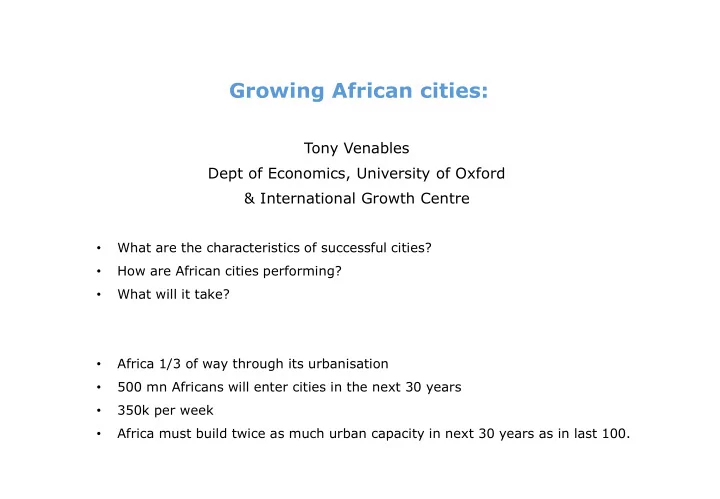

Growing African cities: Tony Venables Dept of Economics, University of Oxford & International Growth Centre What are the characteristics of successful cities? • How are African cities performing? • What will it take? • Africa 1/3 of way through its urbanisation • 500 mn Africans will enter cities in the next 30 years • 350k per week • Africa must build twice as much urban capacity in next 30 years as in last 100. •
Urban potential I Successful cities have high productivity • Developed countries: doubling city size raises productivity 5% • Cities are where new things happen • Centres of innovation • ‘Incubators’ for new firms • What are the mechanisms? Scale and specialisation • Thick labour markets • Matching • Specialisation – and incentives for workers to get skills • Thick product markets • Scale and competition • Access to intermediate goods – forward and backward linkages • Knowledge spillovers • Scale economies in provision of utilities, public services •
Urban potential II Mechanisms work through ‘connectivity’ • Worker<-> firm: Consumer <-> firm: firm <-> firm • Connectivity requires: • Transport infrastructure: • Public investment • Density: • Private investment: residential and commercial • Density is an outcome of efficient land-use: • Market outcome with centre to edge rent gradients and • Textbook ‘ monocentric city’. • ‘Crowding’ vs building tall •
Successful cities: employment density 4
Successful cities: residential density 5
Urban form: residential density 6
Urban form: residential density with non-market outcomes Moscow Johannesburg Brasilia 7
Urban potential III Cities are high cost..... • Commuting, land values, capital costs of infrastructure • ..... but offset by productivity advantage if they achieve efficient land-use, connectivity, productivity • Cities can be self-financing • Much of surplus created by cities is capitalised in land values • Land values are a tax base: • Ethically fair • Non-distortionary • Relatively easy to collect • Sufficient to fund infrastructure (Henry George theorems) •
African cities: stylised facts • Early urbanisation • Urbanisation levels are high for per capita income levels • Challenge for affordability of decent housing • Excessive primacy: • High share of urban population in largest city • Typically not the ‘urban hierarchy’ seen elsewhere • Low levels of investment • Private: Informality – bifurcated residential housing stock, sprawl low density & inefficient land use. (comparable figures – less dense than European cities) • Public: Poor transport infrastructure Poor public service provision poor connectivity • Employment: informality and failure to attract formal sector firms
Cumulative causation and multiple equilibria • Attracting firms & creating jobs: Inefficiencies in land-use and lack of connectivity high cost low real wages but • high nominal wages • Failure to attract footloose manufacturing • ‘Urbanisation without industrialisation’ • Sunk capital and expectations: • Expect slow city growth expect low rents build low lack of density slow city growth • Expensive to retro-fit • Public finance: • Weak tax system and/or low land values hard to finance infrastructure lack of connectivity …. etc In combination, these create real danger of low-level trap.
Policy responses Raising investment – residential/ infrastructure/ commercial Residential • Property rights • Appropriate regulatory standards • Mortgage markets • Infrastructure • To create connectivity and to coordinate expectations • Utilities and other public services • Public finance • Commercial • Efficient land-use/ infrastructure lower cost business environment • Quantitatively – enormous challenge Across many areas of government – city, finance, law, regulation, industry, transport
Recommend
More recommend